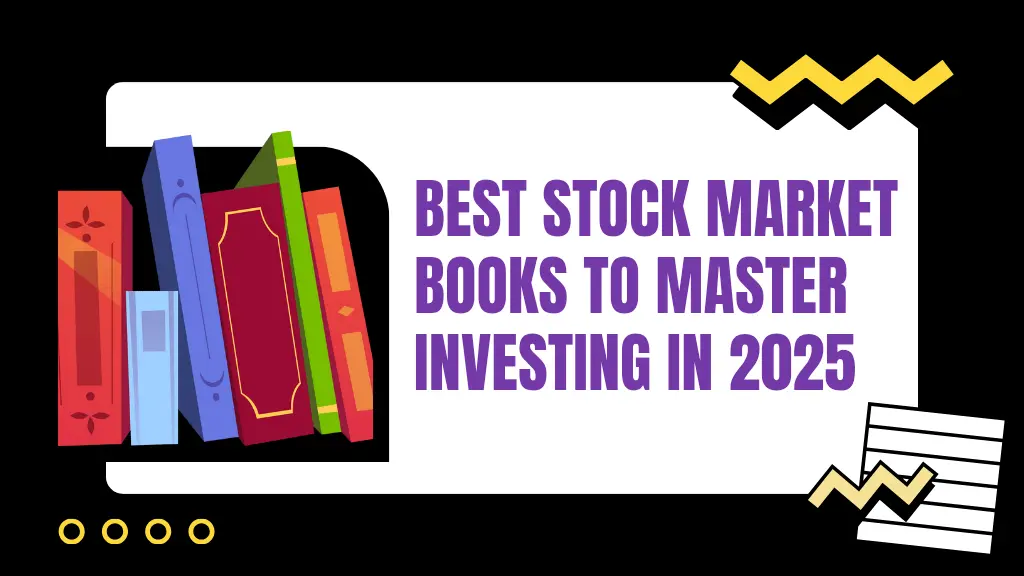If you’re serious about growing your wealth and understanding how markets work, reading the right stock market books can make all the difference.

Books offer deep insights from legendary investors, real-world strategies, and timeless investing wisdom that even YouTube videos or online courses can’t match.
Whether you’re a beginner or an experienced trader, these best stock market books can help sharpen your skills and mindset.
In this article, we’ll cover the top books you must read, along with FAQs and a detailed table for easy comparison.
Top 10 Best Stock Market Books
Here’s a quick overview:
| Book Title | Author | Best For | Key Takeaways |
|---|---|---|---|
| The Intelligent Investor | Benjamin Graham | Value Investing | Long-term investing principles |
| One Up On Wall Street | Peter Lynch | Individual Stock Picking | Spotting winning stocks early |
| Common Stocks and Uncommon Profits | Philip Fisher | Growth Investing | Importance of qualitative research |
| A Random Walk Down Wall Street | Burton Malkiel | Beginners | Efficient market theory explained |
| The Little Book That Still Beats the Market | Joel Greenblatt | Simplified Investing | Magic Formula Investing |
| Market Wizards | Jack D. Schwager | Traders and Investors | Interviews with successful traders |
| The Psychology of Money | Morgan Housel | Behavioral Finance | Mindset and money management |
| Reminiscences of a Stock Operator | Edwin Lefèvre | Trading Strategies | Lessons from a stock speculator |
| Flash Boys | Michael Lewis | High-Frequency Trading (HFT) | How tech is changing trading |
| Beating the Street | Peter Lynch | Intermediate Investors | Practical portfolio management |
Detailed Overview of Each Book
1.The Intelligent Investor – Benjamin Graham
Often called the “Bible of Investing,” this classic teaches value investing principles.
Warren Buffett calls it the best investing book ever written.
Key Lessons:
- Importance of margin of safety
- Emotional discipline in investing
- Investing vs. speculating
Perfect For:
Beginners and long-term investors
2. One Up On Wall Street – Peter Lynch
Peter Lynch shares how ordinary investors can beat professionals if they invest in what they know.
Key Lessons:
- How to identify “10-bagger” stocks
- Understanding business fundamentals
- Trusting your own research
Perfect For:
Stock pickers and DIY investors
3. Common Stocks and Uncommon Profits – Philip Fisher
Fisher introduces the idea of scuttlebutt research — gathering information about a company from suppliers, customers, and competitors.
Key Lessons:
- Qualitative analysis importance
- Management evaluation strategies
- Long-term thinking over short-term trading
Perfect For:
Investors looking for growth stocks
4. A Random Walk Down Wall Street – Burton Malkiel
This book explains that markets are efficient and that index investing beats active management most of the time.
Key Lessons:
- Efficient Market Hypothesis (EMH)
- Basics of portfolio construction
- Why market timing usually fails
Perfect For:
First-time investors
5. The Little Book That Still Beats the Market – Joel Greenblatt
Greenblatt simplifies investing through his “Magic Formula” which ranks companies based on earnings yield and return on capital.
Key Lessons:
- Easy-to-follow investment formula
- Focus on undervalued high-quality businesses
Perfect For:
Those who want a simple investing approach
6. Market Wizards – Jack D. Schwager
This book contains interviews with top traders, revealing their mindsets, strategies, and risk management techniques.
Key Lessons:
- Psychology behind trading success
- Diverse trading methodologies
- Importance of discipline
Perfect For:
Aspiring traders and advanced investors
7. The Psychology of Money – Morgan Housel
Housel explains how your behavior matters more than your financial knowledge.
Key Lessons:
- How emotions influence financial decisions
- Wealth vs. being rich
- Patience and consistency
Perfect For:
Everyone, including non-investors
8. Reminiscences of a Stock Operator – Edwin Lefèvre
A semi-biographical account of legendary trader Jesse Livermore’s life — full of trading wisdom.
Key Lessons:
- Speculation principles
- Risk management
- Importance of market timing
Perfect For:
Those interested in stock trading history
9. Flash Boys – Michael Lewis
Lewis reveals the world of high-frequency trading (HFT) and how technology has transformed Wall Street.
Key Lessons:
- How speed influences modern markets
- Ethical concerns about HFT
Perfect For:
Tech-savvy investors and market enthusiasts
10. Beating the Street – Peter Lynch
In this follow-up to One Up On Wall Street, Lynch gives practical advice on building your own portfolio.
Key Lessons:
- Step-by-step guide to stock research
- Managing a successful investment portfolio
Perfect For:
Intermediate-level investors
Why Should You Read Stock Market Books?
- Learn from Experts: Access decades of investing experience in a few hours.
- Develop Your Strategy: Build your own investing or trading system.
- Avoid Common Mistakes: Understanding where others failed saves time and money.
- Boost Financial Literacy: Helps make smarter personal finance decisions.
FAQs About Best Stock Market Books
Which stock market book is best for beginners?
The Intelligent Investor by Benjamin Graham and A Random Walk Down Wall Street by Burton Malkiel are highly recommended for beginners.
Can reading stock market books guarantee profits?
No book can guarantee profits. However, reading improves your knowledge, reduces costly mistakes, and helps you make informed decisions.
Are older investing books still relevant today?
Yes! While technology evolves, principles of psychology, risk management, and value investing remain timeless.
Should traders and investors read the same books?
Not necessarily.
- Traders should read books like Market Wizards and Reminiscences of a Stock Operator.
- Long-term investors should focus on The Intelligent Investor and Common Stocks and Uncommon Profits.
How many stock market books should I read before investing?
There’s no fixed number. Start with 2-3 core books, practice what you learn, and gradually read more as your experience grows.
Conclusion: Build Your Wealth Through Knowledge
Investing without education is like sailing without a compass.
The best stock market books provide timeless advice that can guide you through bull markets, bear markets, and everything in between.
Choose a few titles from this list, start reading, and most importantly — apply what you learn.
Because knowledge alone won’t grow your wealth, action will.



